PSYCHOLOGY OF US
YOUR RESOURCE LIBRARY
FEELING STUCK?
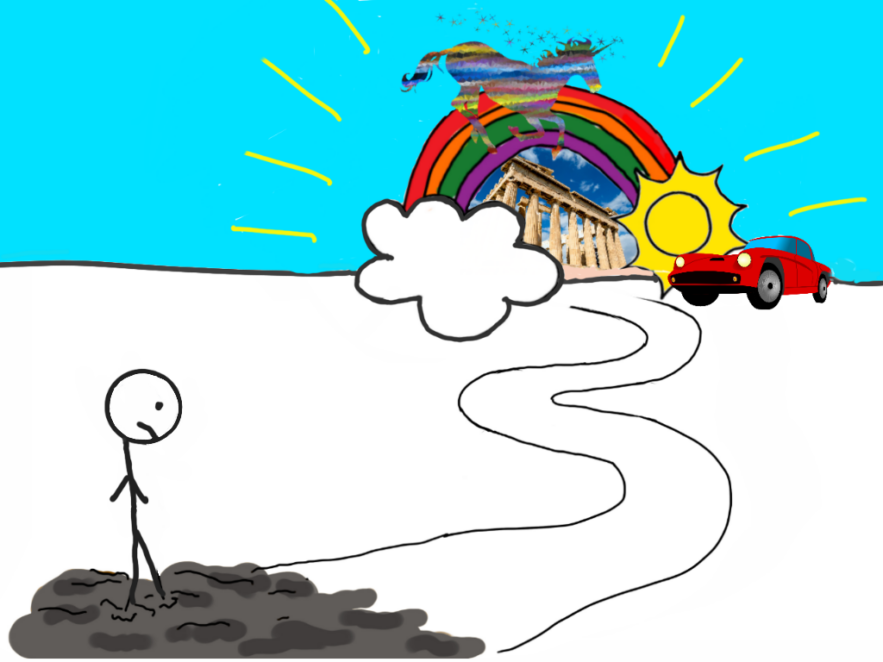
You should stay away from your potential. You don’t want to find out that the most you could possibly achieve if you gave it your all and devoted yourself to improving yourself … would be maybe eating less cheesy snacks. – Dylan Moran
What is Stuckness?
The term ‘stuckness’ is not listed in clinical psychology books but it is very much a real part of our psychological experience. At some point in our lives, we have all felt like we just can’t make progress. We know that there is something that we can do to change our current situation. It’s just there, beyond the stuckness, but for whatever reason, we feel trapped in sludge.
Signs and Symptoms of Stuckness
Sometimes there is no looming deadline to fire us up and get us moving. Our situation is not intolerable and we’re not miserable enough to change, but we are not happy or fulfilled either. We feel, Meh…
In terms of motivation, the Meh can be the most dangerous place to be. Often our Meh feelings are masking more difficult emotions such as fear or anxiety. We distract ourselves with work, others, and the everyday routine to avoid the unsettling prospect of change.
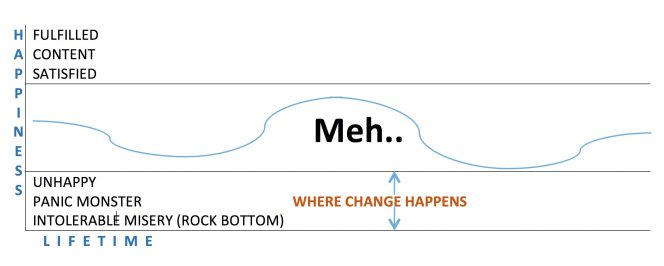
2. Ambivalence
Health psychologists often use a tidy process map to describe the stages of behaviour toward change. According to this model, we start to think about changing; then we commit to changing, make a start, fall off track, only to dust ourselves off in order to start again (1).
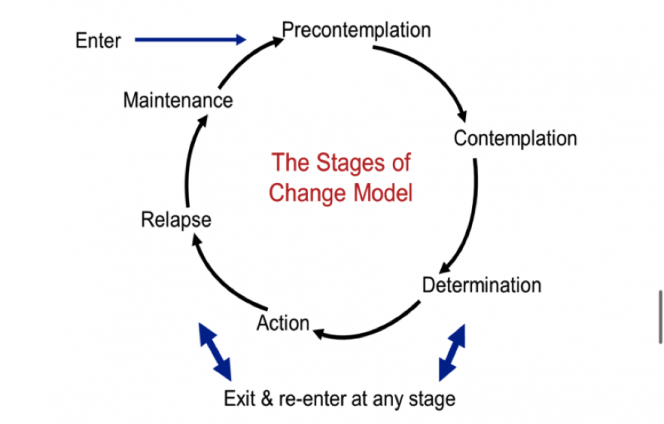
In reality, thought and behavioural change is not tidy; change can be a messy affair that looks and feels more like this:
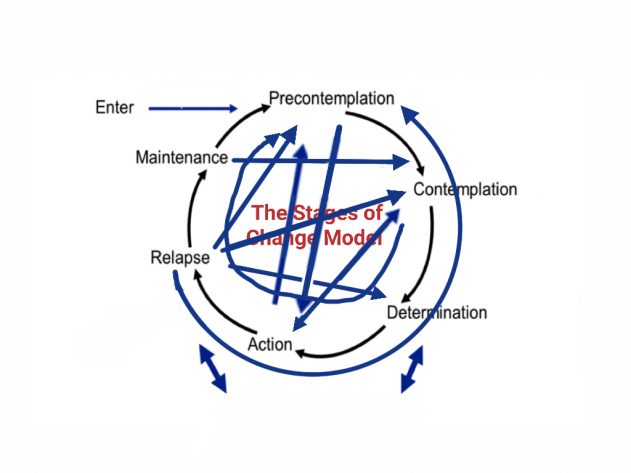
We may think about change, decide to do it, don’t do it, then try somewhat to do it, think about it some more, go on holiday, see a TED Talk and get inspired, jump straight into it without thinking. And then feel stuck and frustrated that it’s not working the way we thought it would and decide we need time to think about it some more.. later.
Life gets in the way of our plans and we are not always logical and linear thinkers. Feeling ambivalent is normal when we want to change but when ambivalence lingers, it can feel as if we are stuck on a merry-go-round, we are moving but we aren’t actually going anywhere.
3. ProcrastinationEver set out to accomplish something only to find yourself engulfed in closet reorganisation or Facebook? Blogger and self-proclaimed procrastinator, Tim Urban, introduces us to two characters we all have in our brains. Each plays a role in our procrastination. The Rational Decision-Maker tries to Get Things Done while the Instant Gratification Monkey is only interested in what is fun and (more importantly) easy (2).
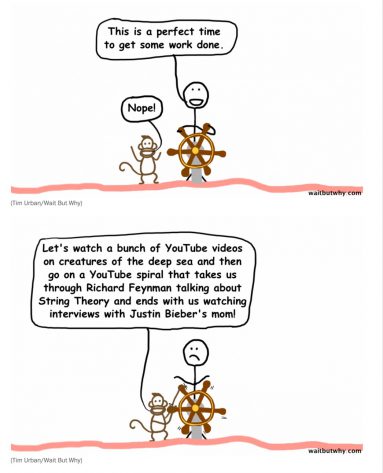
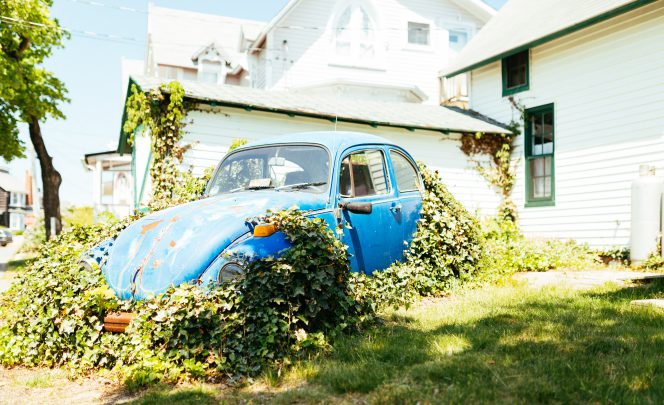 Causes of Stuckness
Causes of Stuckness
In the simplest terms, all stuckness, hesitation, resistance, or inability to change can be traced back to the emotion of fear. Sometimes this fear is well founded and easy to name, but sometimes it is outside of our awareness. A good question to ask yourself is..
Is your stuckness psychological, situational, or both?
1. Situational
No matter how motivated we are to change, sometimes practicalities make moving forward difficult. You may have a fear that you won’t be able to afford to go back to university and that may be founded on a very real lack of funds.
2. Psychological
We may think that we are stuck because we are lazy, busy, or just prone to procrastination. However, if we really want to change but can’t, then emotional roadblocks may be to blame. Stuckness may be caused by a bullying inner critic, negative self-beliefs, or self-defeating behaviour patterns. Anxiety or low mood makes us far more prone to procrastinate. Sometimes stuckness is an indicator of more severe psychological issues such as depression, anxiety, or overactive guilt or shame. 3. BothSome situational stuckness has strong emotional underpinnings. Lack of time may be a time management issue that is underpinned by a fear that we won’t be able to cope. Or the loss of a job, home, or someone we love may be making us feel so heavy that we just can’t move forward.
Consider what internal forces are working against you.
Fear may be stopping us from moving forward but what is triggering the fear? Is it our ability to reach the goal? Or the uncertainty of change? Or the inevitable stress that change will cause? Or is it the goal itself?
Read how our brain’s fear response causes us to stagnate: The Science Behind Stuckness. If you don’t know why you feel stuck or if you know why but just can’t unstick, read: Steps You Can Take Now to Unstick.
Most importantly, you don’t have to figure it out alone.
Many people think that they don’t feel bad enough to warrant therapy. But the intensity of psychotherapy depends on the client’s needs.
FIND OUT MORE: How Monkey therapy Helps You Unstick. The Science Behind Stuckness. Steps You Can Take Now to Unstick.
References and Contributors
- JO Prochaska, JC Norcross & CC DiClemente. (1994). Changing for Good.
- Tim Urban. (2016). Wait But Why Blog: Why Procrastinators Procrastinate. http://waitbutwhy.com/2013/10/why-procrastinators-procrastinate.html
- References and Contributors Mel Robbins. (2011). Stop Saying You’re Fine: Discover a More Powerful You.
- Kelly McGonigal. (2015). The Upside of Stress: Why Stress Is Good for You, and How to Get Good at It.
- Wendy Dryden. (2014). Shame and the Motivation to Change the Self. Emotion.
- Paul Gilbert. (2010). The Compassionate Mind.
- Todd Kashdan. (2015). The Power of Negative Emotion: How Anger, Guilt, and Self Doubt are Essential to Success and Fulfillment.
- Joseph LeDoux. (2015). Feelings: What are they and how does the brain make them? Daedalus.
- Karla McLaren. (2010). The Language of Emotions: What Your Feelings Are Trying to Tell You.
- Gershen Kaufman. (1993). Shame: The Power of Caring.
How therapy works
Worksheets and useful information
Creative Process
Feeling Stuck
Stress
Depression
Feeling Down
Anxiety
Guilt and shame
Find out more
What I do differently
Monkey Therapy
Transformational Coaching
Online Therapy
Trauma
Your inner critic
The science behind it
Steps you can take now
Publications
More than CBT
More than IFS
Psychedelics
Neurodiversity
Thank you!
Your message has been sent. We'll contact you shortly
© 2023 The Monkey Therapist. All Rights Reserved. Site Designed By Samantha Ósk
PRIVACY POLICY